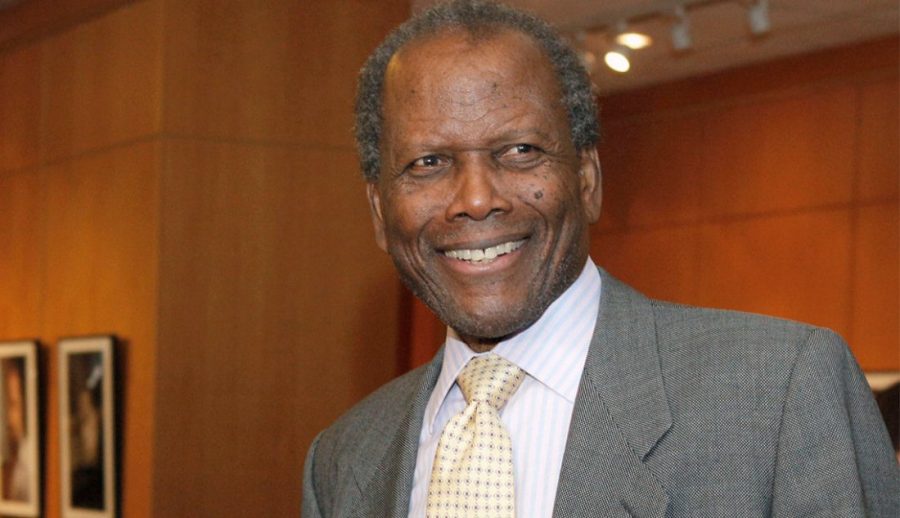“To Sydney, with love”: ground-breaking actor Sydney Poitier dies at 94
The Academy Award-winning actor paved the way for performers of color in America and abroad
January 30, 2022
The Oscar-winning actor Sidney Poitier passed away at the age of 94 due to heart failure on January 6.
Poitier was born in Miami, Florida on February 20, 1927 prematurely, so small that he could fit in his father’s hand. He was not expected to live, however, based on the palm reading his mother sought out, he was said to “walk with kings.”
His parents were tomato farmers moving back and forth from Florida to the Bahamas. When he was 15, his father sent him to Florida with just $3 to live with his brother and experience a life with more opportunities. He soon realized he wasn’t very fond of Miami so he decided to move up north towards New York.
As a young man in New York he decided to try out acting. The start of this newfound career was not met with success. To sustain a living he became a dishwasher in a restaurant where he encountered an unbelievable change. A waiter at the restaurant took an interest in Poitier and decided to help him with his grammar, speech and comprehension skills. They would stay after closing for weeks and work relentlessly to improve Poitier’s literary skills. Because of this he landed work with the American Negro Theatre where he took acting classes and landed a role as an understudy for Harry Belafonte. Eventually this led him to land roles on Broadway and soon catch Hollywood’s attention.
Poitier’s first movie was the 1950 film, “No Way Out,” in which he played a doctor who needed to treat a racist patient. This resulted in more prominent roles like in the film “The Defiant Ones,” where he played an escaped prisoner who had to get along with his inmate to survive.
As a Black man in the acting scene in the 50s, finding roles was a difficult task. He knew what his talents were and what he could portray to the audience which were not the stereotypical, one-dimensional characters that Black actors were given at the time. This prompted Poitier to decline roles that were demeaning to his character and values. No matter the pay he knew that he could do more with his talents than what Hollywood asked for. However, he still managed to find regular acting roles such as the drama “A Patch of Blue,” where he was in a relationship with a blind white woman.
His friendship with the outspoken Harry Belafonte evoked Poitier to embrace the Civil Rights movement of the 1960s. He believed that anyone to view his life in terms of race should be corrected. In his most demanding role in the film “In the Heat of the Night,” he rewrote his contract to include the scene where a Black plantation owner slaps him (a homicide detective) in the face and he slaps the owner back. This retaliatory slap was not in the script; however Poitier requested it be written in and kept in the final version of the film.
Starting in the 1970s Poitier decided to take a step back from acting and focus more on the directing field where he felt to have more control of his projects. Throughout the late twentieth century he directed films and sequels that featured largely Black casts. One of his biggest hits as a director was the movie “Stir Crazy,” a prison-break comedy which featured Richard Pryor and Gene Wilder.
In the early 2000s Poitier decided to retire from acting and turned to a life of playing golf and writing a memoir, “The Measure of a Man: A Spiritual Autobiography.” As time went on, Hollywood finally sought to recognize Poitier for the accomplishments he made for the Black community. Poitier received an honorary Academy Award, an Oscar for best actor, the Presidential Medal of Freedom awarded by former President Barack Obama and The Film Society of Lincoln Center’s highest award in 2011. According to CNN, director Quentin Tarantino stated, “In the history of movies, there’ve only been a few actors who, once they gained recognition, made an impact that forever changed the art form.”
Poitier has influenced Black actors all over the world to know his worth and achieve the highest of honors in the acting world. His ability to prosper in a world that was constantly leading him to take the more arduous path displays the determination of the Black community as a whole. He will forever be known for paving the way for what Hollywood looks like today and the improvements that are still to be made.







